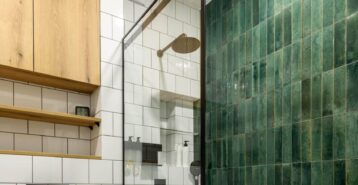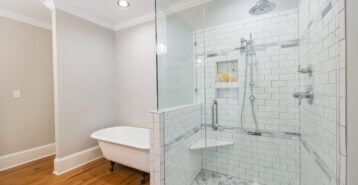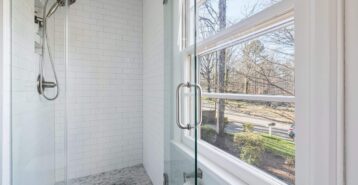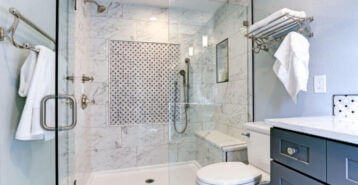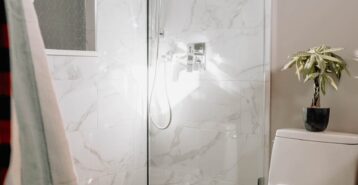What Does a Tub to Shower Conversion Cost?
The cost to convert a bathtub into a shower can range from $1,200 to $15,000+. Ultimately, your project’s final cost will depend on what type of shower you’re replacing your tub with, if any repairs are needed to the space where the shower will go, the materials you choose for your new shower, and labor costs in your area.
The national average cost for a tub to shower conversion is $3,000, with most homeowners choosing a walk-in shower, undergoing minimal repairs, and choosing mid-range materials like an acrylic shower pan and ceramic tile walls.
Before we break down the costs associated with this type of bathroom remodel, let’s talk briefly about what it is.
What Is a Tub to Shower Conversion?
A tub to shower conversion involves removing an existing bathtub and installing a shower in its place. There are some companies that perform this service on its own, and others that replace tubs with showers as well as offering a host of other bathroom remodel services.
In this article, we will break down project costs with the assumption you are not performing other major bathroom remodels at the same time. If you are, then your costs could differ slightly. For example, your labor and plumbing charges may be a bit lower since you will already have contractors on site. Either way, this page is a good starting point as you evaluate project quotes.
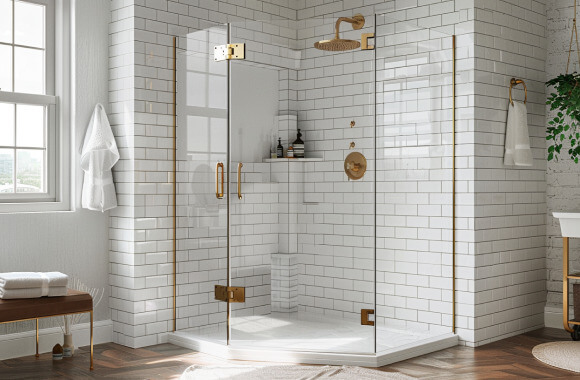
Tub to Shower Conversion Cost by Shower Type
The type of shower you choose will have a large influence over your final project cost. Here’s a look at what to expect from least to most expensive:
| Shower Type | Average Cost Range |
|---|---|
| Pre-Fabricated | $1,200 to $8,000 |
| Corner | $1,500 to $6,000 |
| Framed | $1,800 to $6,500 |
| Walk-In | $2,500 to $15,000+ |
| Semi-Frameless | $2,800 to $8,000 |
| Frameless | $3,500 to $12,000+ |
Not sure which shower type you’re most interested in? You can visit our shower types page to learn more. Here’s a cheat sheet in the meantime:
- Pre-Fab: A pre-fabricated shower kit can be purchased from a big box store and typically comes with a shower pan, shower surround (the wall panels), and either a shower curtain rod or door. These tend to be the most inexpensive option.
- Corner Shower: Designed to fit into the corner of your bathroom, this shower sometimes has a curved glass door and is an excellent space saver. You can read more about when and why to choose this shower type over at our guide to corner showers.
- Framed Shower: Both a framed shower enclosure and a framed shower door have metal supports all the way around. You can learn more about framed showers by reading our guide.
- Walk-in Shower: A modern, popular shower that can fit into both large and small bathrooms. It traditionally does not have a door. Our guide to walk-in showers can tell you more, and you can also read about how much a walk-in shower costs.
- Semi-Frameless Shower: Both a semi-frameless enclosure and door have metal supports on the top and bottom only. Our guide to semi-frameless showers has more information.
- Frameless Shower: This popular and pricey shower has no metal supports at all. It gives bathrooms an open, airy look. You can read about frameless showers and their average cost over at our guide.
Tub to Shower Conversion Cost by Shower Size
Typically, homeowners choose a shower size that fits comfortably into the space where the tub once was. Here are the five most popular shower sizes chosen during this project as well as their average cost range.
| Shower Size | Average Cost Range |
|---|---|
| 32 x 32 inches | $1,000 to $3,000 |
| 36 x 36 inches | $1,200 to $5,500 |
| 36 x 48 inches | $1,500 to $7,000 |
| 36 x 60 inches | $2,000 to $10,000 |
| 42 x 60 inches | $3,500 to $15,000 |
This can be a little hard to visualize, so let’s look at each size in more detail below.
32 x 32 inches: $1,000 to $3,000
Suitable for small spaces, and typically the least expensive due to its compact size. The smaller the shower, the fewer materials needed and the less time it takes to install.
36 x 36 inches: $1,200 to $5,500
Slightly larger, this size provides more room while still being relatively affordable and fitting easily into the space left by the tub.
36 x 48 inches: $1,500 to $7,000
A popular choice that balances cost and space, fitting well in standard bathrooms. This shower size is chosen for many types of shower remodels, so you should have no problem finding materials for the space and contractors with the right experience.
36 x 60 inches: $2,000 to $10,000
This shower size perfectly matches the footprint of a standard bathtub, making it ideal for conversions. It also offers quite a bit of space! However, that extra space means more materials and labor, so it is also one of the more expensive bathtub to shower conversions.
42 x 60 inches: $3,500 to $15,000
This is the largest option that most contractors offer as a “standard” size. It allows for a luxurious showering experience with additional space for features like seating or a second shower head. In addition to being the largest and most expensive option, it will also take the most time to complete.
We have a page dedicated to standard shower sizes if you’d like to learn more about all the sizes available as well as about which sizes are most typical for each shower type.
Other Factors Influencing Cost
Though the type and size of shower you choose will have the largest impact on your final cost, there are several other variables to account for.
- Materials and Fixtures: A prefabricated shower pan will cost less than a ceramic tile floor, and ceramic tile would be less expensive than natural stone. Aside from walls and floors, you will also need to choose a shower head along with other hardware. Finally, be aware that some colors or styles of shower are more expensive than others.
- Labor Costs: You may need to pay for a plumber to move water lines or for a professional to lay tile. Ask contractors how much they expect labor to cost. In general, however, expect the cost of labor and materials for this project to be split about 50/50.
- Permits and Regulations: Depending on where you live, you may need to pull permits for your project. Generally, this should amount to $100 to $300, but costs can increase depending on project complexity and on local building codes.
- Custom Features: Any custom add-ons like tile or fixtures can raise your costs.
- Unexpected Repairs: If there’s any water damage or other kinds of damage that necessitate repairing or replacing the subfloor, that will also add to your final costs.
How All These Costs Break Down
The above cost range includes:
- Bathtub Demolition, Removal, and Disposal: $150 to $800
- Disposal of Debris and Minor Repairs: around $100 to $2,400
- Freestanding Shower Enclosure Installation: $1,000 to $8,000
- Glass Door Installation: $300 to $2,500
- Adding New Fixtures: $50 to $900
- Plumbing Adjustments: $300 to $2,400
How Long Does This Project Take?
It can take anywhere from one day to a full week to replace your bathtub with a shower.
Some companies advertise themselves as “one day” tub to shower conversions. Typically, this is the only service offered, and their contractors work with a pre-selected suite of materials. Not only does that reduce the number of stores you need to go to for samples, but it also means the pros are very well-versed in this project and can get it done quickly. However, you may sacrifice customizations for convenience.
Other companies offer bathtub to shower conversions along with many other upgrades and remodels. If you want to replace your floors, your toilet, or your cabinets/sink in addition to swapping your tub for a shower, you may want to choose a more full-service contractor. However, it may take a few days to complete the project.
Choosing the Right Contractor

Regardless of the shower type and size, and regardless of which type of company you decide to hire, there are a few best practices to follow to ensure you get the right contractor at the right price.
- Look for licensed, insured contractors with experience in bathroom renovations. Check reviews and ask for references to ensure quality work. You also might be able to find recent examples of their work online/on their social media.
- Plan to get three to four quotes. Our research shows this is the magic number for finding the best price. Be wary of any “too good to be true” prices, and make sure you ask for the quotes to be broken down so you can see what each contractor is estimating for each part of the project.
- Ask for their recommendation on shower type and size, materials you should use, and how to keep your project in your budget.
Questions to Ask Potential Contractors
- What is your experience with tub to shower conversions?
- Can you provide references or examples of past work?
- What is the estimated timeline for the project?
- What is included in your quote?
- How much do you recommend setting aside for unexpected costs or repairs?
The Bottom Line
Converting your tub to a shower can enhance your bathroom’s functionality and aesthetics. With careful planning and consideration of costs, you can even add value to your home. Visit our full guide to shower remodels if you want to learn more about all the decisions and timelines associated with this project.
If you’re ready to start your tub to shower conversion project, you can visit our contractor directory to see pros available in your area. If you’d rather have us do the research for you, simply click below and answer a few questions about your project, and we will match you with up to four professionals.
Compare top-rated bathroom remodel pros in your area.
Read real homeowner reviews, explore qualifications, and view promotions. Modernize makes it easy to browse professionals and find one that will be perfect for your project.






